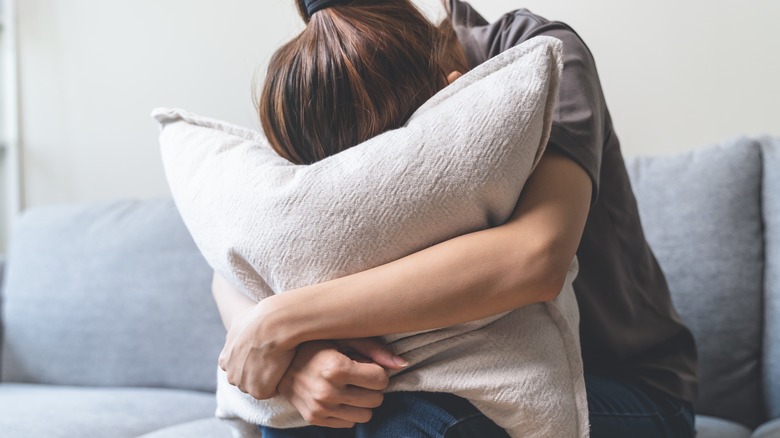Owning Your Emotions And Navigating The Murky Waters Of A Long-Distance Breakup
As more of us become connected around the world with easily accessible transport options, hopping about the globe has become a convenient reality for many. Alongside these modern-day advancements, long-distance relationships have become increasingly commonplace, with roughly 14 million of us being in one. Perhaps you even know someone who is or has been in a long-distance relationship, or maybe you're even in one yourself. However, most relationships take a lot of work, time, and effort from both parties, and unfortunately, they don't always work out.
While splitting can be tricky when you live within close proximity to an ex-partner, navigating the world of long-distance breakups can leave you on an uncertain playing field — especially if it's your first time. If you're also a victim of delicate dumping at the same time, then you may find it even more challenging.
Thankfully, there are plenty of ways you can help yourself through this challenging transition. Whether the split was mutual or one-sided, we'll dive into some valuable tips you can utilize in your day-to-day life to help you navigate your emotions and get back on track.
Process the emotions from your breakup
One of the first steps of healing from a long-distance relationship is to process your emotions, which may be quite tricky to begin with. Dr. Kelli Harding, M.D., explained to Everyday Health, "Grief over a different future than imagined is often a part of the dynamic," adding, "Losing a relationship with someone you love at any age is painful and takes time to heal." Naturally, the grieving and healing process will likely look different for everyone. For some individuals, processing their emotions may only take a couple of weeks, whereas for others, it may take months. It's highly specific for each individual, and you shouldn't feel rushed through it all. Instead, take your time and practice taking good care of yourself.
You may feel anger, grief, sadness, and even self-doubt. Much of this will likely depend on the type of relationship you had and the very individual circumstances under which it ended. However, all of these emotions are very normal and can be expected at such a turbulent time. Of course, it's always important to remember never to let your feelings take your reactions to situations too far. For example, lashing out at others may only push them further away.
Spend time with your friends
Ending a long-distance relationship can be tough, especially if you often rely on your partner for emotional support. For many, resurfacing from a relationship like this can often feel lonely, especially if you're used to having your partner just a phone call away to fill up your alone time. While it will be a tricky ride, there are ways you can support yourself in this situation.
A great way to combat any loneliness or isolation you may feel is by spending time with your friends and family. If you have close friends to whom you can express your feelings, even better. Doing so should help you to feel more uplifted, especially if you're receiving a lot of support.
Dr. Deborah Lee, M.D., explained to Marie Claire why this is so important: "Bereavement specialists say that those who do the best coping with grief, and people who are able to distract themselves from what has happened, do it through contact with close family and friends or through work." Although it won't be a replacement for your partner, it should certainly help to ease any heavy emotions you're feeling. Bottling them up may only make things worse.
Find a new hobby
As well as spending more time with your friends and wider social circle, you may also find it beneficial to begin a new hobby. This could include anything from a new sport to something more laid-back, such as art, pottery, reading, or even walking. Taking part in many of these activities will allow you to meet new people, fill up your time and keep you busy. This should help to distract your mind from thinking about your relationship, and while it's important to process emotions, it's also important not to get bogged down in them.
If you often spent time participating in specific activities with your long-distance partner, replacing these old activities with a new hobby may help provide some relief. However, if it's something you enjoy, you can continue doing it. After all, you don't want to remove all the fun from your life. In addition, if you don't want to go alone, you can bring someone along with you — a friend or family member — to enjoy either old or new activities.
Try not to dwell on the past
When you're tucked up in bed or curled up on the sofa, it can be all too easy to start dwelling on the past. Doing so may only make you feel worse, which means you'll spend more time upset. Try deleting any old photos or messages so you can resist the temptation of peeking at them. In the long term, deleting these old memories may help you.
This is arguably a crucial part of your healing process, as it can help you express your feelings, speak openly about your situation, and eventually move past it. Even if you feel resistant, having people to lean on is also incredibly important during this time. However, Dr. Harding notes to Everyday Health, "If days turn into weeks that you're having trouble functioning at work or in school, please go talk to someone. It is okay to feel sad, but it is not okay to stop living your life." You should make sure to look out for some telltale signs of post-breakup depression, which may help to indicate if you need to take action based on the way you're feeling.
Don't check their social media
Participating in a long-distance relationship usually means that a large portion of your time is filled with online communication and phone calls. With this technology at our fingertips, we can access our partners in seconds. While this has benefits, it can make it all the more challenging if you're trying to move on from a broken relationship. Naturally, the urge will still be there to take a sneak peek at what they're up to and who they're with.
If you can help it, you should make an effort to refrain from checking your ex's social media. By checking it, you may make it more challenging for yourself to carry on as usual and form new connections. If you know that you may find this challenging, you can always try deleting the apps off your phone temporarily or even deactivating your account so you can't log on. When you feel ready, you can return in your own time. Doing so should help to support your overall healing process and let you focus on other elements of your life.





